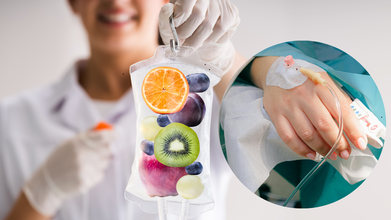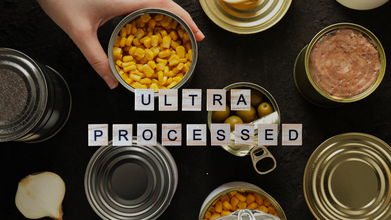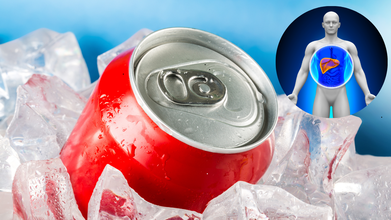- Health Conditions A-Z
- Health & Wellness
- Nutrition
- Fitness
- Health News
- Ayurveda
- Videos
- Medicine A-Z
- Parenting
- Web Stories
IV Hydration For Vitamins Could Be Putting Your Life At Risk, According To Doctors

Credits: Canva
While more and more IV hydration spas are coming up in the US, a new study published on October 6 in JAMA Internal Medicine found that IV hydration industry operates with almost no regulation and little medical evidence to support its supposed health benefits.
The co-author of the study Dr Peter Lurie, who is the president of the Center for Science in the Public Interest told the NBC News that these businesses are operating "almost completely without evidence. As a result there is a real danger to consumers".
In the US, out of the 50 states, or 32 have some kind of rule or policy related to IV hydration services, however, only four states: Alabama, North Carolina, South Caroline and Vermont have a comprehensive oversight. These hydration spas offer pricey vitamin infusions that promise energy, detox or immune support. Apart from the lack of evidence to sustain its claim on the benefits IV hydration supposedly offers, it is also an expensive process. According to the American Med Spa Association, this industry has exploded into a $15 billion wellness industry.
Is it really worth it?
Here is what the doctors say about IV hydration:
Dr Shrey Kumar Srivastav, Senior Consultant, Internal Medicine at Sharda Hospital told Health and Me that while there is no standard frequency for IV therapy in healthy individuals, "frequent or routine use can cause vitamin toxicity or electrolyte imbalances."
Dr Prashant Sinha, Head of Emergency and Internal Medicine at PSRI Hospital, Delhi, said that for a healthy person with no diagnosed deficiency, there is generally no medical reason to receive IV supplements regularly. "Getting them too frequently can lead to nutrient overload or dependency, where the body becomes less efficient at natural nutrient absorption," he pointed out.
Both the doctors also debunk the claim that IV supplements are better than the vitamins one consumes through food. "Supplements taken orally or through food are typically safer, more sustainable, and sufficient for most people," explained Dr Srivastava.
Also Read: If You're Alone At Home And Experience A Heart Attack, Here's How You Survive: According To Doctor
Dr Sinha also clarified that IV supplements are in most cases not better than supplements consumed through food or medicines. "Whole foods provide not only individual nutrients but also fiber, antioxidants, and enzymes that support overall health. Oral supplements, when taken as prescribed and for medically confirmed deficiencies, are also effective for most people and pose far fewer risks than IV therapy," he points out.
Dr Srivastava further added that IV supplements are not superior to food or oral supplements for general wellness or weight loss. "The growing trend of using IV injections for cosmetic or slimming purposes is risky, unregulated, and can be fatal."
Lurie also said, "This is a medical system that exists largely outside of conventional medicine. We are also worried that there will be adverse effects related to this."
Alex Thiersch, the CEO of the American Med Spa Association said that many of the owners of these businesses do not realize that they are practicing medicine, however he notes, "If you are putting a needle in someone's vein, that's 100% medical practice."
War Against Ultra Processed Foods: New California Law Asks School To Phase It Out Soon

Credits: Canva
Ever since Donald Trump's administration has taken over with RFK Jr as the Health Minister, the war over ultra processed food has been declared. Now, California will phase out certain ultra processed meals over the next decade under a first-in-the-nation law signed Wednesday by Gov Gavin Newsom.
What Will This Law Do?
The first and foremost job of this law is to define what ultra processed foods are. The law seeks to define it as 'super-tasty products typically full of sugar, salt and unhealthy fats'. The law would require the state's Department of Public Health to adopt rules by mid-2028 defining 'ultra processed foods of concern' and 'restricted school foods'.
When Will The Schools Start Fading Out Foods?
The legislation requires the school to start phasing out these foods by July 2029, and districts will be barred from selling them for breakfast or lunch by July 2035. Vendors will also be banned from providing the 'foods of concern' to schools by 2032.
Jennifer Siebel Newsom and state lawmakers also signed the measure at a middle school in Los Angeles.
“California has never waited for Washington or anyone else to lead on kids’ health, we’ve been out front for years, removing harmful additives and improving school nutrition,” Newsom said in a statement. "This first-in-the-nation law builds on that work to make sure every California student has access to healthy, delicious meals that help them thrive.”
Newsom had issued an executive order earlier this year that required the Department of Public Health to provide recommendations by April on limiting harms from ultra processed foods. The Democratic governor also signed a law in 2023 that banned certain synthetic food dyes from school meals.
War Against Ultra Processed Foods
Legislatures from across the country have introduced some 100 bills or even more in the recent months to ban or require the labelling of chemicals that make up the ultra processed foods. These labeling include artificial dyes and controversial additives.
Why Is This Worrying?
Americans get more than half of their calories from ultra processed foods. This has been linked to many health problems, including obesity, diabetes, and heart diseases. However, it has still not been studied much to prove that foods directly impact these chronic health issues.
How To Define Ultra Processed Foods?
Defining “ultra processed foods” has always been a bit complicated. The most widely used system, the Nova classification developed by Brazilian researchers, sorts foods into four categories based on how much they’re processed.
In general, ultra processed foods are those that contain industrial ingredients you’d never find in a home kitchen—think additives, flavor enhancers, and preservatives. However, the line isn’t always clear. Some highly processed foods, like tofu, certain whole-grain breads, or infant formulas, can still be nutritious. Researchers continue to debate whether it’s the processing itself or the combination of sugar, fat, and salt that drives negative health outcomes.
To settle the confusion, U.S. health officials have recently begun working on a federal definition of ultra processed foods, noting that current descriptions might not fully capture which foods pose real health concerns.
Just One Can Of Soda Is Enough To Damage Your Liver, Diet Soda Could Make It Worse, Suggests Study

Credits: Canva
Drinking just one can of soda, whether regular or diet, can significantly increase your risk of developing a deadly liver disease, suggested new research. The study is conducted by the First Affiliated Hospitals of Soochow University in Suzhou, China, and the findings were presented at the United European Gastroenterology Week (UEG Week), 2025.
The study showed that people who consumed just 250 grams of soda daily, which is less than a standard 12-ounce can, had a higher likelihood of developing metabolic dysfunction-associated steatotic liver disease (MASLD), formerly known as the non-alcoholic fatty liver disease (NAFLD).
What was more alarming is that diet sodas appeared to be worse offenders, as the low or non-sugar sweetened beverages (LNSSBs) raised risk of MASLD up to 60%, while sugar-sweetened beverages (SSBs) increased it by 50%.
Also Read: If You're Alone At Home And Experience A Heart Attack, Here's How You Survive: According To Doctor
“These findings challenge the common perception that these drinks are harmless and highlight the need to reconsider their role in diet and liver health, especially as MASLD emerges as a global health concern,” said Lihe Liu, the study’s lead author and a graduate student in gastroenterology.
What Did The Study Find?
The study followed nearly 124,000 adults who did not have any liver disease as part of the UK Biobank, and tracked the participants' beverage habits over a 10-year period. The researchers used a 24-hour dietary questionnaire to assess how often and how much soda people drank.
As a result, a clear link between soda intake, even in small amounts and liver fat buildup, MASLD was seen. The researchers also discovered that soda intake led to excess fat accumulation in the liver, causing inflammation, scarring, and eventually conditions such as cirrhosis or liver cancer. As per the Cleveland Clinic, this kind of chronic liver damage can shorten life expectancy.
MASLD was once thought to affect only the people who consume a large quantity of sugar or alcoholic drinks, however, the new research now suggests that even less than one can of soda could increase the risk significantly.
Why Diet Soda Could Be Worse?
“Sugar-sweetened beverages can cause rapid spikes in blood glucose and insulin, promote weight gain, and increase uric acid levels, all of which contribute to liver fat accumulation,” explained Liu.
Also Read: Explained: What Are The 3 Scientists Awarded Nobel Prize In Medicine For?
However, the surprising part is that diet soda could cause more harm. Why? They are often marketed as the healthier option, however, they are more harmful due to the addition of artificial sweetener. "They may affect liver health by altering the gut microbiome, disrupting the feeling of fullness, driving sweet cravings, and even stimulating insulin secretion,” Liu said.
Even though diet sodas contain fever calories, they could confuse body's metabolic processes, making it harder to regulate appetite and blood sugar, both of which can contribute to liver fat buildup.
What Is The Impact?
MASLD is the leading cause of liver cancer and liver failure worldwide. In the US alone, it has surged by 50% over the past three decades and affects about 38% of the population.
The researchers suggested to replace soda with water. As per Liu, replacing sugary beverages with water could reduce the risk of MASLD by 12%, while replacing an artificially sweetened one lowered the risk by 15.2%.
“The safest approach is to limit both sugar-sweetened and artificially sweetened drinks,” Liu emphasized. “Water remains the best choice as it removes the metabolic burden and prevents fat accumulation in the liver, whilst hydrating the body.”
Croissant In a Gut-Friendly Food, Says NHS Surgeon

Credits: Insta and Canva
Whenever we have to think of a quick food, we think of breads. However, we are usually advised against it, but Dr Karan Rajan, NHS Surgeon has a different view to offer. He says that croissant, if made in the traditional way could actually be a gut-friendly food. “This is my legal argument to explain why croissants should be considered a gut health food. It has to be a traditional croissant because it is made using laminated yeast dough that undergoes slow fermentation. This process allows the yeast and lactic acid bacteria to partially break down some of the starches, making the final product easy to digest compared to under-fermented white bread,” he said.
What Is The Right Way To Have A Croissant?
He suggests that if you let a baked croissant cool down before eating, it helps turn the starch into resistant starch. This, also helps feed the bacteria in the colon. “A croissant eaten mindfully for breakfast allows the body to lessen its said,” he said.
So, Is Croissant Really Better Than Regular Bed?
Experts have suggested that when dough ferments, natural bacteria and yeast partially break down the starches and gluten. This also makes the final product easier to digest and gives it a unique flavor.
Whether or not the croissant is healthy really depends on the way it is made. If the croissant is fermented, it is gut-friendly, otherwise, it is not.
What Should People Keep In Mind?
People must go for fermented bread, as it is easier on the stomach. This is especially good for those who feel bloated after consuming regular bread. The fermented bread will also have a lower glycaemic effect, which means they cause a slower rise in blood sugar as compared to unfermented or regular bread. It is also important to note portion control, however, warn experts.
However, one must keep in mind that while most people can have fermented breads, it should be consumed in moderation.
Are There People Who Cannot Have This Gut-friendly Food?
People with celiac disease or serious gluten intolerance should stay away from them. This is because not always does fermentation remove all the gluten. However, fermented options could be better for those struggling with diabetes, however it should still be eaten in moderation.
What one must keep in mind is that fermented breads are smarter treats, but mot an everyday meal. For everyday meal, try to balance it with whole grains, millets, and high-fibre foods.
Dr Ulysses Wu, MD, with Hartford HealthCare also noted that sourdough, which is also a type of fermented bread could have potential health benefits.
“The long fermentation process partially breaks down gluten and phytic acid, a compound that could block mineral absorption. For many people, that makes sourdough easier on the stomach,” Dr. Wu notes.
The fermentation process, he says could lower glycemic index, which could help with blood sugar control. Furthermore, it is high in prebiotics, which can act like fuel for the healthy bacteria already in your gut.
However, he also notes that fermentation does not fully remove gluten, so it must be consumed in moderation.
© 2024 Bennett, Coleman & Company Limited

